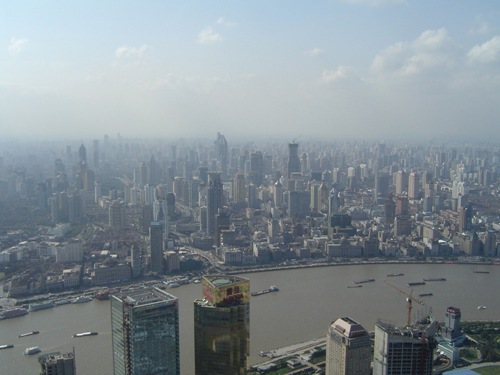Increasing industrial activity is deteriorating air quality and posing a major health risk. The WHO estimates that annually 1.3 million deaths occur due to urban outdoor air pollution. If emissions continue at the present levels, then by 2050, most of the people in the world will be affected by unhealthy air quality. In order to address this drastic deterioration of worldwide air quality, effective new government policies and action has to be undertaken.

A view of Shanghai's polluted sky (image by photoeverywhere.co.uk)
Andrea Pozzer, a scientist presently at the Max Planck Institute of Chemistry in Germany, has led a research team to study the effect of man-made emissions on the quality of air. They found that the global emission trends indicate a continuation of the past trends when no additional measures than those that were in place in 2005 and no additional climate change were considered.
Implementation of emission-reduction measures may not be effective when a strong growth in economy is being experienced in certain areas of the world; and implementing air-quality measures that are expensive may not be possible in areas experiencing an economic downturn.
Eastern China and northern India regions have a high population density and they experience elevated air pollution. The researchers state that in 2050, the air quality will be significantly worse in these regions. When compared to the air pollution in Asia, the increase in air pollution in North America and Europe will be significantly less due to the existing mitigation policies.
The researchers used an atmospheric chemistry model to estimate the quality of air in 2005, 2010, 2025 and 2050. They found that pollutants such as PM2.5 fine particulate matter, sulphur dioxide and nitrogen dioxide will increase to high levels in 2025 and 2050.
When considering all pollutants including human activity, sea spray, volcanic emissions and desert dust, the regions of eastern China, North Africa, the Middle East, and northern India are projected to have the worst air quality.
Disclaimer: The views expressed here are those of the author expressed in their private capacity and do not necessarily represent the views of AZoM.com Limited T/A AZoNetwork the owner and operator of this website. This disclaimer forms part of the Terms and conditions of use of this website.